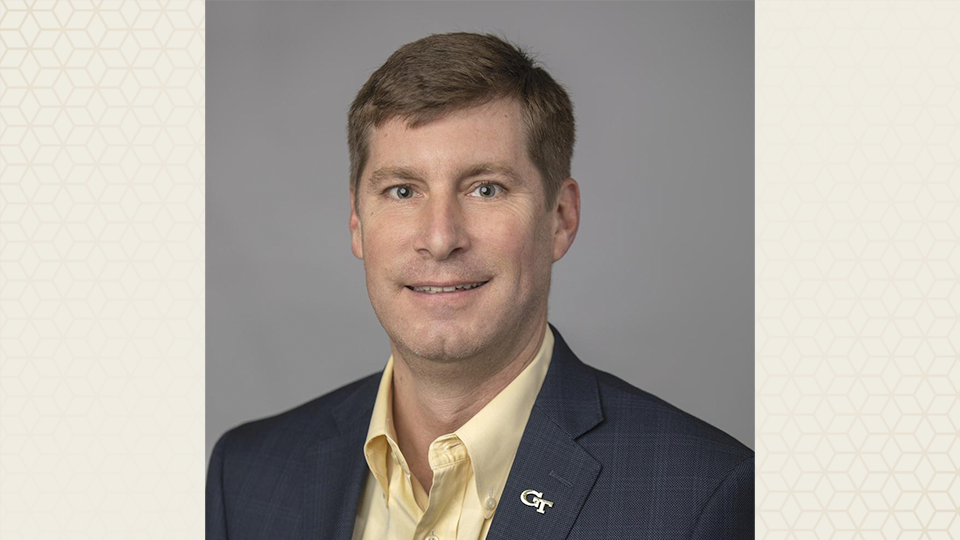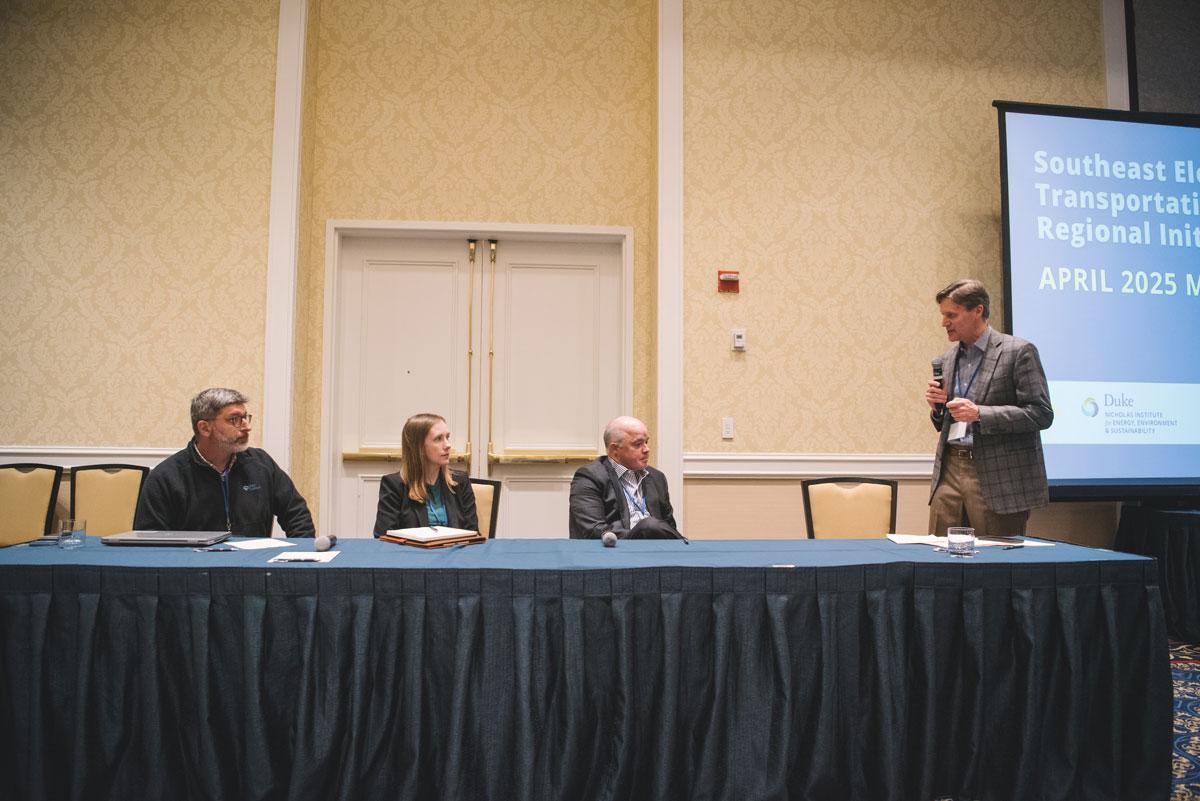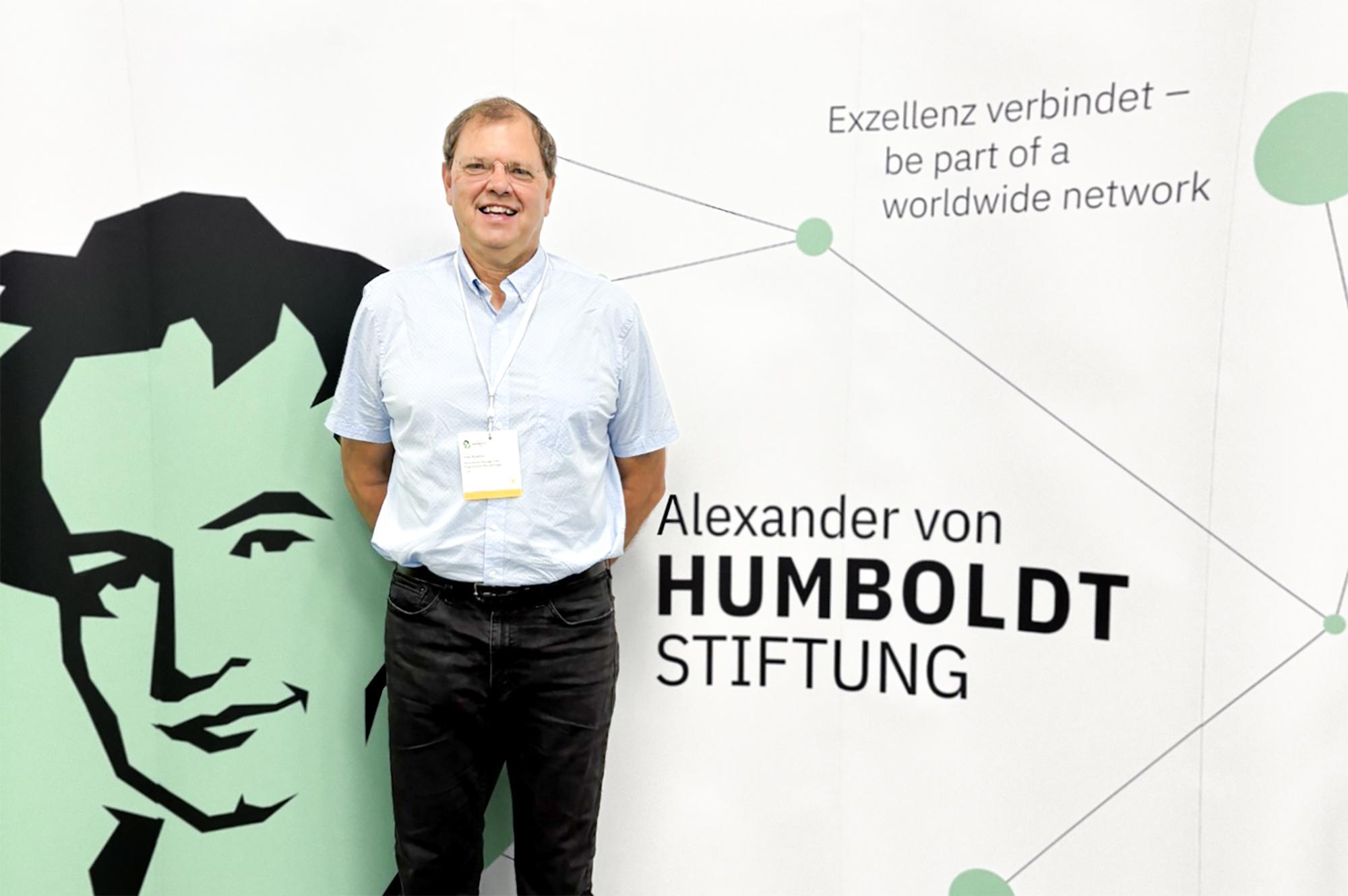Ready Named Inaugural Executive Director of the Georgia Tech Space Research Institute
Jun 30, 2025 — Atlanta, GA

Effective July 1, W. Jud Ready will serve as the inaugural executive director of Georgia Tech’s new Space Research Institute (SRI), which will officially launch on the same date.
The SRI builds upon Georgia Tech’s long and distinguished history in space research and exploration. By uniting experts across disciplines — from aerospace engineering to planetary science, astrophysics, robotics, policy, the arts, and origin of life explorations — the SRI aims to create a resilient ecosystem for space research that can adapt and thrive, even in an era of fiscal uncertainty. It is composed of faculty, staff, and students whose collaborative research spans a broad spectrum of space-related topics, all deeply connected to advancing our understanding of space and its impact on the human experience.
“The launch of the SRI comes at a pivotal moment for the scientific community,” said Vice President of Interdisciplinary Research Julia Kubanek. “As the federal government proposes major cuts to funding agencies, our interdisciplinary research institutes are striving to support faculty and make them more competitive across disciplinary boundaries. This institute will publicly showcase impactful research led by Georgia Tech faculty, attract new collaborators, and pursue alternative funding strategies via philanthropic and industry partners.”
The Space Research Institute will consist of an interdisciplinary community of faculty across Georgia Tech’s schools, colleges, and the Georgia Tech Research Institute (GTRI).
“It is an honor to be appointed executive director of the Space Research Institute,” said Ready. “My plan is to provide internal and external space researchers with access to Georgia Tech’s world class facilities and turbocharge the space activities already underway. We’re committed to empowering our existing community while forging new partnerships that will expand our reach and impact across the global space ecosystem.”
Ready, a principal research engineer in GTRI’s Electro-Optical Systems Laboratory, is the first GTRI faculty member to serve in a long-term capacity as an IRI executive director. Prior to his appointment, he served as associate director of external engagement for the Georgia Tech Institute for Matter and Systems and director of the Georgia Tech Center for Space Technology and Research (CSTAR). He is also an adjunct professor in the School of Materials Science and Engineering at Georgia Tech.
Before joining the Georgia Tech faculty, Ready worked for General Dynamics and MicroCoating Technologies. Throughout his career, he has served as PI or co-PI for grants totaling more than $25M awarded by the Army, Navy, Air Force, DARPA, NASA, NSF, NIST, DOE, other federal sponsors, industry, charitable foundations, private citizens, and the States of Georgia and Florida. His current research focuses primarily on energy capture, storage, and delivery enabled by nanomaterial design. His research has been included on three missions to the International Space Station, two others to low earth orbit, and one perpetually in heliocentric orbit (Lunar Flashlight). His future space missions include MISSE-21 to the International Space Station and SSTEF-1 to the Lunar surface. A half dozen solar cells from his past missions to the International Space Station will be included in the permanent At Home in Space exhibit opening on the Smithsonian National Air and Space Museum's 50th Anniversary.
Ready has received numerous awards and honors for his work. His most recent awards include the Class of 1934 Outstanding Innovative Use of Education Technology award in 2025 and the Outstanding Achievement in Research Program Development award in 2023, both from Georgia Tech. He also received the One GTRI Collaboration Award in 2022, which he was awarded during GTRI’s annual Distinguished Performance Awards celebration.
Additional articles of interest:
10 Questions with Jud Ready
Space Station Testing Will Evaluate Photovoltaic Materials
Laurie Haigh
Research Communications
Regional Electric Transportation Experts Gather at Duke University
Jun 09, 2025 — Durham, NC

Richard Simmons (Georgia Tech Strategic Energy Institute and SETRI co-facilitator) (right) moderates a panel on charging infrastructure featuring (from left) Tom DelViscio (Duke Energy) Emily Belding (IONNA) and Ben Rogers (Electrada). [
More than 70 people convened at Duke University and virtually on April 3 to highlight successes, challenges and opportunities across research, industry and policy on regional electric mobility in the Southeast.
The April 2025 Southeast Electric Transportation Regional Initiative (SETRI) meeting provided an information-sharing forum for a multisector group of electric mobility organizations from across the region. SETRI is a collaborative network connecting, informing and advancing transportation electrification in the Southeast. The event was hosted by the Duke University Nicholas Institute for Energy, Environment & Sustainability and Georgia Tech Strategic Energy Institute, in collaboration with SETRI partner organizations.
“Bringing this multisector community together is important to share ideas on how to best advance electric mobility—a key emerging industry in the southeastern United States and important strategy for reducing transportation emissions,” said Trey Gowdy, Nicholas Institute research lead and SETRI co-facilitator.
Throughout the morning, speakers shared insights about the electric vehicle (EV) landscape in North Carolina and throughout the Southeast, the state of the EV market and manufacturing, charging infrastructure, consumer education and local engagement and more. The event also featured a poster session, networking and an electric vehicle display.
SETRI organizers announced during the meeting that the Southeast Portal for Electric Transportation Opportunities has shared more than 500 opportunities since launching two years ago. The portal lists active funding sources, comment solicitations, research opportunities, events and other timely information related to transportation electrification in the region.
“A focus of the SETRI network has been to deepen connections within our region, with the aim of accelerating progress between utilities, charging companies, investors, NGOs and universities. It was great to be in Durham after our session in Atlanta last year,” said Richard Simmons, principal research engineer at the Georgia Tech Strategic Energy Institute and SETRI co-facilitator.
Read Full Story on the Duke Nicholas Institute for Energy, Environment and Sustainability Newspage
Priya Devarajan || Research Communications Program Manager, SEI
Joel Kostka receives Humboldt Research Award
Jun 26, 2025 — Atlanta, GA

Professor Joel Kostka at the Alexander von Humboldt Foundation annual meeting and reception in Germany this week.
This week, Professor Joel Kostka was awarded the prestigious Humboldt Research Award by the Alexander von Humboldt Foundation during its annual meeting and reception with Germany’s Federal President Steinmeier in Berlin. Every year, the Foundation grants up to 100 Humboldt Research Awards worldwide, which recognize internationally leading researchers of all disciplines.
The award’s €80,000 endowment will support a research trip to Germany for up to a year — during which Kostka will collaborate with Professor Marcel Kuypers, director of the Max Planck Institute for Marine Microbiology in Bremen, Germany — to assess the role of marine plant microbiomes in coastal marine ecosystem health and climate resilience.
Kostka, who holds joint appointments in the School of Biological Sciences and School of Earth and Atmospheric Sciences, is also the associate chair for research in Biological Sciences. He was recently named the inaugural faculty director of Georgia Tech for Georgia's Tomorrow. The new Center, announced by the College of Sciences in December 2024, will drive research aimed at improving life across the state of Georgia.
Wetlands in a changing climate
“Human population is centered on coastlines, and coastal ecosystems provide many services for people,” Kostka says. “Although they cover less than 1 percent of the ocean, coastal wetlands store over 50 percent of the seafloor’s rich carbon reserves.” But researchers aren’t sure how these ecosystems will respond to a changing climate.
Microbes may be the key. Microbes play a critical role in maintaining plant health and helping them adapt to stressors, Kostka says. Similar to human bodies, plants have microbiomes: a community of microbes intimately associated with the plant that help it take up nutrients, stimulate the plant’s immune system, and regulate plant hormones.
“Our research indicates that plant microbiomes are fundamental to wetland ecosystem health, yet almost everything we know about them is from agricultural systems,” he adds. “We know very little about the microbes associated with these important marine plants that dominate coastal ecosystems.”
Kostka’s work in Germany will investigate how microbiomes help coastal marine plants adapt to stress and keep them healthy. From there, he will investigate how plant microbiomes contribute to the carbon and nutrient cycles of coastal ecosystems — and how they contribute to ecosystem resilience.
Expanding collaboration — and insights
One goal of the collaboration is to exchange information on two types of marine plants that dominate coastal ecosystems worldwide: those associated with seagrass meadows and salt marshes.
“I’ve investigated salt marsh plants in the intertidal zone between tides, and my colleagues at the Max Planck Institute have focused on seagrass beds and seagrass meadows, which are subtidal, below the tides,” Kostka says. “While these two ecosystems have some different characteristics, they both cover large areas of the global coastline and are dominated by salt-tolerant plants.”
In salt marshes, Kostka has shown that marine plants have symbiotic microbes in their roots that help them to take up nitrogen and deal with stress by removing toxic sulfides. He suspects that these plant-microbe interactions are critical to the resilience of coastal ecosystems. “The Max Planck Institute made similar observations in seagrass meadows as we did in salt marshes,” Kostka explains. “But they found different bacteria.”
From Georgia to Germany
Beyond supporting excellence in research, another key goal of the Humboldt Research Award is to support international collaboration — something very familiar to Kostka. “I've been working with Professor Kuypers and the Max Planck Institute in Bremen for many years,” he says, adding that he completed his postdoctoral research at the Institute. “Max Planck's labs are some of the best in the world for what they do, and their imaging technology can give us an unprecedented look at plant-microbe interactions at the cellular level.”
“This project is also special because I am collaborating with other scientists in northern Germany,” Kostka adds. “The University of Bremen is home to the Center for Marine Environmental Sciences (MARUM), which is designated as a Cluster of Excellence by the German National Science Foundation, so there are a number of fantastic research centers in Bremen to work with.”
His hope is that this project will deepen collaboration between the research at Georgia Tech and research in Germany. “I look forward to seeing what we can uncover about these critical systems while working together.”
Written by Selena Langner
Contact: Jess Hunt-Ralston
Space Station Testing Will Evaluate Photovoltaic Materials
Jun 24, 2025 —

Solar cells account for approximately six percent of the electricity used on Earth; however, in space, they play a significantly larger role, with nearly all satellites relying on advanced solar cells for their power. That’s why Georgia Tech researchers will soon send 18 photovoltaic cells to the International Space Station for a study of how space conditions affect the devices’ operation over time.
“The main goal here is to improve power generation in space,” said Jud Ready, principal research engineer at the Georgia Tech Research Institute (GTRI) and Associate Director of External Engagement with Georgia Tech’s Institute for Matter and Systems. “The limiting factor on the performance of a spacecraft is usually how much power you can produce. Power, size, weight, complexity, cost – all of these are tied closely to the electrical generation of the solar panels.”
Media Inquiries: gtri.media@gtri.gatech.edu
Writer: John Toon (john.toon@gtri.gatech.edu)
GTRI Communications
Georgia Tech Research Institute
Atlanta, Georgia USA
To Mach 5 and Beyond
May 19, 2025 —

Anirban Mazumdar (Photo: Candler Hobbs)
Imagine boarding a jet in Atlanta and arriving in Japan in about the time it takes now to fly to Miami or Chicago.
That’s just one of the possibilities of research in an area of ultrafast flight called hypersonics. The term refers to traveling at roughly a mile a second, or about five times the speed of sound and faster.
Interest in hypersonics is growing, with early notions of high-speed passenger travel alongside defense and space applications driving questions about meeting the demands of Mach 5+ flight.
Such speeds introduce a host of new challenges for aerodynamics, thermal management, and rapid decision-making that Georgia Tech engineers are working to solve.
For Anirban Mazumdar in the George W. Woodruff School of Mechanical Engineering, aerospace questions have always been fascinating.
Hypersonics is an area where those questions are tough. Uncovering answers can have real impact on unlocking new capabilities for travel across the globe or to space, in addition to national security implications.
“It’s very challenging. We are trying to deal with very extreme scenarios, and we’re trying to do it, not just to advance science, but primarily because it matters to our country,” Mazumdar said. “That combination is incredible.”
By: Joshua Stewart (jstewart@gatech.edu)
Georgia Tech Alumni Develop Device to Understand Moon’s Water Content
Jun 16, 2025 —

Athena landed on its side with MSOLO glowing. [Image courtesy of Intuitive Machines]
When NASA’s PRIME-1 Mission landed on the moon in March, an Intuitive Machine’s lander named Athena ended up on its side. The faulty landing meant the instruments couldn’t drill into the moon to measure water and other resources, as intended. But the mission wasn’t a total loss: PRIME-1’s The Regolith Ice Drill for Exploring New Terrain (TRIDENT) and Mass Spectrometer Observing Lunar Operations (MSOLO) could still operate and gather some data. The mission, led by Georgia Tech alumni who collaborated with Georgia Tech faculty, is already pivotal to future NASA missions.
PRIME-1, or Polar Resources Ice Mining Experiment-1, is a combination tool of two instruments: TRIDENT and MSOLO. PRIME-1’s objective is to help scientists determine resources available on the moon, with the eventual goal of sending humans to live there. TRIDENT is a space-rated drill designed and built by Honeybee Robotics that can extract lunar soil up to 3 feet deep. MSOLO is a mass spectrometer that can analyze TRIDENT’s soil samples for water and other critical volatiles. Together, this data can show how viable living on and mining from the moon could be.
Two Georgia Tech alumna, Jackie Williams Quinn and Janine E. Captain, led the PRIME-1 team for NASA. They had help with computer modeling of PRIME-1’s mass spectrometer data from Georgia Tech’s Regents’ Professor Thom Orlando and Senior Research Scientist Brant Jones in the School of Chemistry and Biochemistry.
Georgia Tech to the Moon
Georgia Tech’s expertise influenced all areas of developing PRIME-1, but perhaps their biggest contribution was the collaboration across disciplines.
Quinn, a civil engineering graduate, wrote the initial proposal. She also managed TRIDENT’s development, through a contract with Honeybee Robotics, ensuring it was also built to operate in the harsh lunar environment (a process known as ruggedizing). The team worked with Honeybee’s Jameil Bailey, fellow Tech alumnus.
Captain, the MSOLO principal investigator and chemistry Ph.D. graduate, never planned to work at NASA. But her advisor, Orlando, got her interested.
“What drew me to NASA’s In-Situ Resource Utilization team is that I could apply the instrumentation techniques that I learned in my Ph.D. to measuring vital things like oxygen on the moon,” Captain said.
Ruggedization Redux
When it was confirmed in 2008 the moon had water, NASA wondered if humans could one day live there. Having a functional mass spectrometer on the moon was paramount to determining where the water was and how much of it existed. Captain’s team modified a commercial mass spectrometer and tested it in a harsh environment comparable to the moon: Hawaii’s dormant shield volcano, Mauna Kea. Once they demonstrated the mission operation in this environment, they worked to ruggedize an existing one manufactured by instrumentation company INFICON. The team worked with INFICON and through lab tests, they showed that all components of the mass spectrometer functioned in a lunar vacuum environment.
In Orlando’s lab, his team experimented with lunar material to determine how water interacts with lunar soil. From there, they created a theoretical model that simulated how much water they might find from what PRIME-1 sampled.
“To create the model, we used the data of how water sticks to the lunar surface — from controlled experiments carried out in our ultra-high vacuum chambers at Georgia Tech,” Orlando said. “We approached the problem from a surface physics point of view in these lab experiments, but then in our model, we were able to connect to the actual mission activity.”
Once PRIME-1 hardware validation testing was finished, NASA was ready to launch. That’s when things got hairy.
“We don't fully understand everything that happened during the landing, but the fact that PRIME-1 was fully functional is pretty amazing,” Captain said. “We got the data. It was so cool to know that all this work we did was worth it.”
Moon Milestones
Although they didn’t get the chance to drill into the moon as planned, they can still analyze the data PRIME-1 pulled from the lunar atmosphere. This data includes how the spacecraft may have contaminated the local atmosphere.
“PRIME-1 was the only instrument that got to fully run and check out everything because when the lander fell over, the instrument was on top,” Quinn noted. “They were able to extend the drill all the way out a meter. It was drilling into empty space, but we were able to show that the drill got the signal from Earth, fully extended, and was able to auger and percuss. We were also able to fully operate MSOLO and gather data on gases coming off the lander in its final resting orientation.”
Tess Malone, Senior Research Writer/Editor
tess.malone@gatech.edu
Georgia Tech’s RBI Unveils State-of-the-Art Multiphase Forming Lab
May 13 marked a historic date for Georgia Tech’s Renewable Bioproducts Institute (RBI) and its home in the Paper Tricentennial Building with the grand opening of the Multiphase Forming Lab, the first significant building renovation in 30 years. Built in the 1990s, the Paper Tricentennial Building commemorates 300 years of U.S. papermaking history and supports research and education in paper science and engineering.
Can Cool Roofs Help Atlanta Beat the Heat? Georgia Tech Experts Weigh In
Jun 12, 2025 — Atlanta, GA

In a unanimous vote on June 2, the Atlanta City Council approved a significant ordinance requiring all new and replacement roofs to be built with light-colored, reflective materials, commonly known as “cool roofs.” The ordinance, set to take effect in one year, is part of a growing effort to reduce the city’s vulnerability to extreme heat.
Georgia Tech researchers say the new policy marks a major step forward in climate adaptation, especially for heat-vulnerable communities, and could help position Atlanta as a national leader in urban resilience.
How Cool Roofs Can Help Hotlanta
”On any given summer afternoon, temperatures in Atlanta’s intown neighborhoods can be as much as 15 degrees Fahrenheit higher than in the city’s most forested areas,” said Brian Stone, professor in the School of City and Regional Planning and associate director of Georgia Tech’s Center for Urban Resilience and Analytics.
That spike is partly due to the urban heat island effect — a phenomenon driven by heat-trapping materials like concrete, asphalt, and dark rooftops, combined with the loss of trees and natural landscapes. The impacts are not just uncomfortable — they’re dangerous. Extreme heat is now one of the deadliest forms of weather in the U.S., with disproportionate effects on low-income communities, elderly residents, and those without access to air conditioning.
According to Patrick Kastner, assistant professor in the School of Architecture, rooftops are key contributors. “A major driver [of heat buildup] is dark, heat-absorbing material that stores solar energy during the day and then re-radiates it at night. If you look at a satellite image, for most of the day rooftops have more exposure to the sun than building facades — so the material choice there matters a lot.”
The Power of Reflective Roofs — and Trees
Stone and his students conducted modeling that found that widespread adoption of cool roofs across Atlanta could lower summer afternoon temperatures by more than 2 degrees Fahrenheit in many neighborhoods. That’s comparable to findings in other global cities like London, where cool roofs have reduced average temperatures by up to 2 degrees Celsius (3.6 F).
But cool roofs are only one part of a broader urban cooling strategy. In the same study, Stone’s team showed that planting trees in just half of Atlanta’s available planting zones could yield an even more dramatic effect, reducing temperatures by 4 F or more in some areas.
“Cool roofs are highly effective, but pairing them with increased urban tree cover would multiply the benefits, especially for neighborhoods currently lacking shade,” Stone said.
Equity and Energy Impacts
Atlanta’s ordinance requires cool roofing materials on new commercial construction and when existing commercial roofs are replaced. While that may sound like a technical design tweak, Stone emphasized its equity implications.
“Residents in South and West Atlanta, where tree canopy is sparse, and energy costs take up a larger share of household income, stand to gain the most,” Stone said. “When a cool roof is installed as part of a required roof replacement, those households will see meaningful reductions in cooling costs month after month.”
Kastner added that cool roofs could ease pressure on the electrical grid, lowering peak energy demand required for cooling during extreme heat and possibly reduce the risk of outages.
Durability, Maintenance, and Design Trade-offs
Stone noted that cool roofs tend to extend the life of roofing materials by limiting thermal degradation. However, he and Kastner also flagged some trade-offs.
For example, highly reflective coatings can create glare, especially on sloped roofs near neighboring buildings. The ordinance accounts for this by setting different standards for flat and pitched roofs. Maintenance is another consideration: over time, reflective coatings may degrade or become dirty, requiring periodic cleaning to maintain performance.
“Aesthetics and material compatibility may also challenge adoption when it comes to historic buildings or for roofs already outfitted with solar panels,” Kastner said. “But advancements in roofing technology, including high-performance materials that aren’t plain white, offer more flexible options than ever before.”
A Cool Roof Policy With National Impact
While cities like New York and Chicago have implemented cool roof programs for over a decade, Atlanta’s proposed ordinance is one of the most comprehensive in the country — applying to all roof types, not just flat industrial ones.
“Atlanta is steadily emerging as one of the most climate-resilient cities in the U.S.,” said Stone, pointing to the city’s urban forest and growing network of floodable parks as complementary resilience strategies. “Adding a best-in-class cool roofing ordinance to that portfolio is a bold step forward.”
And it could spark innovation across the region.
“Georgia Tech is uniquely positioned to help advance climate-resilient design,” Kastner said. “From research on advanced coatings to urban planning tools that target the most heat-vulnerable areas, we’re bringing science and policy together to shape cooler, healthier cities.”
Ayana Isles
Senior Media Relations Representative
Institute Communications
2025 Society of Engineering Science Technical Meeting
2025 SES Annual Technical Meeting | October 12-15, 2025
Hosted by the Georgia Institute of Technology
The Society of Engineering Science Technical Meeting is held annually to provide an interdisciplinary forum for the exchange of ideas and information among the various disciplines of engineering and the physical and life sciences as well as mathematics.
Important dates:
Deadline for mini-symposium submission | 1/10/2025
Open for abstract submission | 3/15/2025
